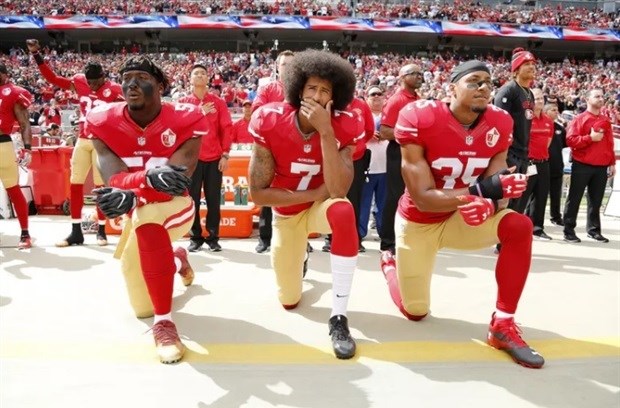Nike's courageous new ad campaign mixing racial politics with sport will be vindicated

The protests had initially targeted police violence against people of colour but broadened into a wider protest against US President Donald Trump after he said any player who knelt during the anthem was a “son of a bitch”. Trump, who continues to suggest that the NFL should withhold the kneeling players’ salaries, said the new Nike ad was a “terrible message … that shouldn’t be sent”.
Nike’s ad featured a powerful black and white photo of Kaepernick telling consumers to “believe in something. Even if means sacrificing everything.” The hashtag #JustDoIt struck a chord, trending for 24 hours on Twitter.
Believe in something, even if it means sacrificing everything. #JustDoIt pic.twitter.com/SRWkMIDdaO
— Colin Kaepernick (@Kaepernick7) September 3, 2018
There was an immediate backlash from conservatives against the Nike advert. On social media, fans posted images and videos of burnt Nike jerseys and shoes using the hashtag #justburnit.
In a tweet that went viral, country musician John Rich showcased socks with the Nike swoosh cut out. Nike’s stock price tumbled, losing 3% percent in market value.
Our Soundman just cut the Nike swoosh off his socks. Former marine. Get ready @Nike multiply that by the millions. pic.twitter.com/h8kj6RXe7j
— John Rich (@johnrich) September 3, 2018
Not all the response to the Kaepernick ad has been negative. Many people support the NFL protests, and celebrities like the rapper Common, and Russell Crowe (along with Serena Williams, who is sponsored by Nike) joined in the #justdoit conversation online.
Corporate activism
Perhaps no company is more aware of the power of popular political activism than Nike. In the 1990s, a popular consumer boycott in response to Nike’s environmental and labour practices severely undermined the company’s profits.
In joining forces with the Bend the Knee movement, Nike joins a host of companies taking on progressive political causes including LGBT rights, tax reform, and free speech. Most recently, in the US, the sporting goods retailer Dick’s stopped selling assault weapons after a student killed classmates in Florida with a gun purchased from one of their stores.
Marketing experts are divided over the wisdom of companies engaging in political action. Activism can show consumers that companies care about more than profits, but as conservatives’ reaction to Nike shows, taking a stand can be risky.
Over the long term, Nike probably hopes to benefit from this stand: its key demographics in the US and worldwide are younger and blacker than the people protesting them. Younger Americans are said to strongly support Kaepernick’s protest, and they are the biggest consumers of Nike products. Nike also knows that consumers develop brand loyalty early in their lives and maintain it for a long time.
Nike probably also faced considerable pressure from athletes who are increasingly using their personal brands to engage in politics. Basketballer Lebron James, Nike’s biggest spokesman in the NBA, has feuded with the Donald Trump and condemned his policies as racist. Michael Jordan has sided with James against the embattled president.
Conservatives that want to avoid athletes and clothing retailers affiliated with Bend the Knee will find it increasingly hard to do so.
The NFL’s return this weekend will only reignite the debate over the anthem protests. With almost the whole sports world seemingly arrayed against their politics it is easy to understand why some Republicans, like Fox News Host Laura Ingram, just want athletes such as James to “shut up and dribble.”
Colin Kaepernick and other athletes (while no doubt being handsomely paid by Nike) are boldly speaking out. In the future, Kaepernick and Nike will be vindicated for their bravery.![]()
Source: The Conversation Africa

The Conversation Africa is an independent source of news and views from the academic and research community. Its aim is to promote better understanding of current affairs and complex issues, and allow for a better quality of public discourse and conversation.
Go to: https://theconversation.com/africa



























